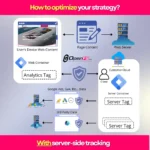Does AI-Generated Content Help with SEO? Understanding the Real Impact on Search Rankings
Let’s cut through the noise and talk about what’s really happening with AI content and SEO. I’ve been watching business owners struggle with this question, and honestly, the answer isn’t as straightforward as the AI tool vendors want you to believe. Does AI-generated content help with SEO? Sometimes yes, sometimes no – but the real magic happens when you understand exactly how to use it.
Here’s the thing: AI content creation has exploded onto the scene, and everyone’s either terrified they’ll be left behind or convinced it’s the silver bullet for all their content marketing problems. Neither extreme is right. What I’ve seen work best is a thoughtful approach that treats AI as a powerful assistant rather than a replacement for human insight and expertise.
How Search Engines Really View AI-Generated Content for SEO
Google’s stance on AI content has evolved significantly, and here’s what matters: they don’t care if a robot or a human wrote your content. What they care about is whether that content genuinely helps searchers find what they’re looking for. This shift in perspective changes everything about how we should approach AI content creation.
The search giant’s algorithms have become incredibly sophisticated at detecting content quality signals. They’re looking for originality, depth, accuracy, and most importantly, genuine value for readers. Whether you typed every word yourself or had an AI assist you is irrelevant – what matters is the end result. For businesses exploring search engine optimization strategies, this means focusing on quality over production method.
Quality Signals That Matter Most for AI Content and SEO Performance
When evaluating content, search engines look for several key indicators that determine ranking potential. First, they assess whether the content demonstrates real expertise and authority on the topic. This is where many AI-only approaches fall short – they can’t replicate the nuanced understanding that comes from actual experience in your field.
Additionally, search engines evaluate user engagement metrics like time on page, bounce rates, and whether visitors take meaningful actions after reading. If your AI content doesn’t connect with readers on a human level, these metrics will suffer, ultimately hurting your rankings regardless of how many keywords you’ve included.
The Strategic Benefits of Using AI-Generated Content for SEO
When used strategically, AI can transform your content production capabilities. I’ve seen small businesses go from publishing once a month to maintaining a consistent weekly schedule, all while improving their content quality. The key is understanding where AI excels and leveraging those strengths intelligently.
Scaling Content Production Without Sacrificing Quality
One of the biggest challenges businesses face is maintaining a consistent publishing schedule. AI tools can help you overcome this hurdle by streamlining the content creation process. Instead of staring at a blank page for hours, you can use AI to generate initial drafts, outlines, and research summaries that accelerate your workflow.
This increased efficiency means you can cover more topics, target more keywords, and provide more value to your audience – all crucial factors for SEO success. The businesses that win with AI content are those that use the time saved to add deeper insights, better examples, and more thorough editing to their pieces.
Comprehensive Topic Coverage and Semantic SEO
AI excels at identifying related topics and ensuring comprehensive coverage of a subject. Modern SEO isn’t just about targeting a single keyword – it’s about creating content that addresses the entire topic cluster. AI tools can analyze top-ranking content and identify gaps in your coverage, helping you create more thorough resources that search engines love.
For example, if you’re writing about “small business accounting,” AI can help you identify related subtopics like tax preparation, bookkeeping software, financial reporting, and cash flow management. This comprehensive approach signals to search engines that your content is a complete resource, improving your chances of ranking for multiple related queries.
Critical Limitations: Where AI-Generated Content Falls Short for SEO
Now, let’s talk about where AI content can actually hurt your SEO efforts. I’ve seen too many businesses make costly mistakes by over-relying on AI without understanding its limitations. These weaknesses aren’t just theoretical – they directly impact your ability to rank and convert visitors.
The Authenticity Gap in AI Content Creation
AI can’t share real experiences, tell genuine stories, or provide the kind of unique insights that come from actually working in your industry. This authenticity gap becomes increasingly problematic as search engines get better at identifying and rewarding content that demonstrates real expertise.
Think about it: when you’re searching for advice on running a business in New Jersey, do you want generic information that could apply anywhere, or do you want insights from someone who actually understands the local market, regulations, and business environment? Your potential customers feel the same way, and search engines are getting better at recognizing this preference.
Accuracy Issues and the AI Hallucination Problem
Here’s a scary reality: AI tools sometimes make things up. They’ll confidently state “facts” that sound plausible but are completely wrong. I’ve seen AI-generated content claim specific statistics about local markets, cite non-existent studies, and even invent quotes from industry experts. Publishing this kind of content doesn’t just hurt your SEO – it destroys your credibility.
For businesses focused on building trust and authority in their market, these accuracy issues present a serious risk. Every piece of AI-generated content needs thorough fact-checking and verification, especially when it comes to data, statistics, and specific claims about your industry or local market. Understanding how search engines work helps you appreciate why accuracy matters so much for rankings.
The Hybrid Approach: Maximizing AI Benefits While Maintaining SEO Excellence
The most successful businesses I work with have figured out the secret: it’s not about choosing between AI and human content creation. It’s about combining them strategically to get the best of both worlds. This hybrid approach lets you leverage AI’s efficiency while maintaining the authenticity and expertise that drive real SEO results.
Using AI as Your Content Creation Assistant
Think of AI as your research assistant and first-draft writer, not your content strategist. Start by using AI to generate outlines, research key points, and create initial drafts. Then, bring in your human expertise to add real examples, verify facts, inject personality, and ensure the content actually serves your audience’s needs.
For instance, you might use AI to draft a post about “Best Practices for Small Business Marketing in 2025,” but then enhance it with specific examples from your work with New Jersey businesses, add local market insights, and include real case studies that demonstrate your expertise. This approach gives you the efficiency benefits of AI while maintaining the authenticity that both readers and search engines value.
Strategic Task Division for Optimal Results
Success with AI content comes from understanding what tasks to delegate to AI and what to keep human. Let AI handle the heavy lifting of research, initial drafting, and identifying content gaps. Reserve human effort for adding unique insights, ensuring accuracy, maintaining brand voice, and creating genuine connections with your audience.
This division of labor becomes especially important for local businesses. While AI can help you identify keywords and topics, only you can add the local flavor, community connections, and regional expertise that make your content stand out in local search results. For businesses looking to improve their local SEO performance, this human touch is non-negotiable.
Implementing AI Content in Your SEO Strategy: A Practical Framework
Ready to start using AI content strategically? Here’s a framework that’s worked well for businesses I’ve advised. It’s not about diving in headfirst – it’s about thoughtful implementation that enhances rather than replaces your existing content efforts.
Start with a Content Audit and Clear Goals
Before you touch any AI tool, understand what’s already working in your content strategy. Look at which pages drive the most organic traffic, which content converts best, and where you have gaps in topic coverage. This baseline helps you make strategic decisions about where AI can add the most value.
Set clear goals for what you want to achieve with AI assistance. Maybe you want to increase publishing frequency, cover more long-tail keywords, or create more comprehensive guides. Having specific objectives helps you measure success and adjust your approach based on real results rather than assumptions.
Develop a Robust Review and Enhancement Process
The biggest mistake I see businesses make is publishing AI content without proper review and enhancement. Create a systematic process that includes fact-checking every claim, adding personal insights and examples, adjusting tone to match your brand voice, and ensuring local relevance for your target audience.
Document this process so everyone on your team follows the same standards. Include specific checkpoints for accuracy, originality, brand alignment, and user value. This consistency ensures that whether you’re creating content in-house or working with freelancers, the quality remains high enough to support your SEO goals.
Beyond Blog Posts: Expanding AI’s Role in Your SEO Ecosystem
AI’s potential extends far beyond just writing blog posts. Smart businesses are finding innovative ways to use AI throughout their entire SEO strategy, from technical optimization to user experience improvements. Understanding these broader applications helps you maximize your investment in AI tools.
Technical SEO and Site Optimization
AI tools can analyze your website’s technical foundation and identify issues that might be holding back your rankings. They can spot broken links, suggest schema markup improvements, identify page speed bottlenecks, and recommend site structure optimizations. These technical improvements create a stronger foundation for all your content, whether AI-assisted or fully human-written.
For businesses managing complex websites, AI’s ability to process large amounts of data quickly becomes invaluable. Instead of manually checking hundreds of pages, you can use AI to identify priority issues and focus your human effort on implementing solutions. This efficiency is particularly valuable when combined with professional web development services that can implement technical improvements effectively.
User Experience and Conversion Optimization
AI can analyze user behavior patterns to identify opportunities for improving the on-site experience. By understanding how visitors interact with your content, where they get stuck, and what drives conversions, you can make data-driven improvements that benefit both users and search rankings.
These insights become particularly powerful when combined with conversion rate optimization strategies. AI can help you identify which content elements drive action, suggest personalization opportunities, and even predict which visitors are most likely to convert based on their behavior patterns.
Future-Proofing Your SEO: Preparing for AI’s Evolution
The relationship between AI and SEO will continue evolving rapidly. Staying ahead means understanding not just where we are today, but where we’re heading. Here’s what smart businesses should prepare for as AI technology advances and search engines become even more sophisticated.
The Rising Bar for Content Quality
As more businesses adopt AI content tools, the volume of content online will explode. This means search engines will become even more selective about what ranks well. Simply having content won’t be enough – you’ll need content that truly stands out through unique insights, exceptional user experience, and genuine value that goes beyond what AI can generate alone.
Prepare for this future by investing in developing your unique perspective and building genuine expertise in your field. The businesses that will thrive are those that use AI to amplify their authentic voice rather than replace it. Consider how emerging trends in AI-powered SEO might impact your strategy moving forward.
Integration with Emerging Technologies
AI content creation is just the beginning. We’re moving toward a future where AI will help create dynamic, personalized content experiences that adapt to individual users in real-time. This could include content that changes based on user behavior, automated video and audio content creation, and interactive elements that respond to user queries instantly.
Start preparing now by ensuring your website infrastructure can support these advances. Work with developers who understand both current SEO best practices and emerging technologies. This forward-thinking approach positions you to take advantage of new opportunities as they arise.
Making the Right Decision: Does AI-Generated Content Help Your SEO?
So, does AI-generated content help with SEO? The answer depends entirely on how you use it. When implemented as part of a thoughtful strategy that combines AI efficiency with human expertise, it absolutely can boost your search rankings and organic traffic. But relying on AI alone, without adding genuine value and human insight, is a recipe for disappointment.
The key is finding the right balance for your specific business. Consider your resources, expertise, and goals. If you’re a small business owner already stretched thin, AI can help you maintain a consistent content schedule. If you’re an expert in your field with unique insights to share, AI can help you share those insights more efficiently and comprehensively.
Remember, the goal isn’t to fool search engines or pump out as much content as possible. It’s to create genuinely helpful resources that serve your audience while supporting your business goals. AI is simply a tool that, when used wisely, can help you achieve that goal more effectively. For businesses ready to take their digital presence to the next level, understanding comprehensive SEO strategies becomes essential for long-term success.
Frequently Asked Questions
Can Google detect AI-generated content?
Google’s algorithms don’t specifically hunt for AI content to penalize it. Instead, they evaluate content quality regardless of how it was created. What matters is whether your content provides genuine value, demonstrates expertise, and satisfies user intent. Poor quality content gets penalized whether it’s AI-generated or human-written.
Should I disclose when content is AI-generated?
While Google doesn’t require disclosure, transparency can build trust with your audience. If AI played a significant role in creating content, consider noting that it was “AI-assisted” rather than fully AI-generated, especially if you’ve added substantial human editing and expertise.
How much should I edit AI-generated content for SEO?
Plan to spend significant time editing and enhancing AI content. At minimum, you should fact-check all claims, add personal insights and examples, adjust for brand voice, and ensure local relevance. Think of AI output as a rough draft that needs substantial human refinement to rank well.
What’s the best AI tool for SEO content creation?
There’s no one-size-fits-all answer. Different tools excel at different tasks. Some are better for long-form content, others for technical writing or creative copy. Test multiple options with free trials to find what works for your specific needs and industry.
Will AI eventually replace human content creators for SEO?
Unlikely. While AI will continue to become more sophisticated, the need for genuine human expertise, creativity, and connection will remain crucial for SEO success. The future belongs to those who can effectively combine AI efficiency with human insight, not those who rely on either approach exclusively.
 Written by: Romulo Vargas Betancourt
Written by: Romulo Vargas Betancourt
CEO – OpenFS LLC







